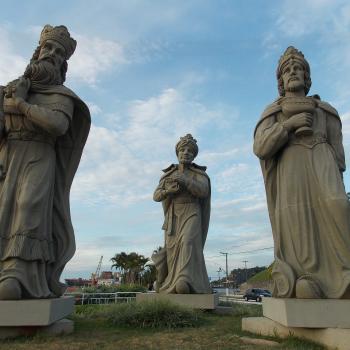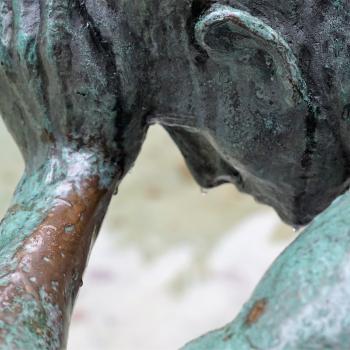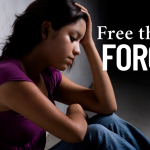 Marriage is the ultimate melting pot. Unless you’re one of those whose families knew each other well prior to their children marrying, if you’re married, you have probably had an experience something like mine.
Marriage is the ultimate melting pot. Unless you’re one of those whose families knew each other well prior to their children marrying, if you’re married, you have probably had an experience something like mine.
He was an Episcopalian; I was an Evangelical Free Churcher. He was from California; I was from Colorado. He was a junior lifeguard; I think water belongs in the shower. He went to a large secular university; I went to a small Christian college. His family had a grand and formal dinner on Christmas Eve (and if you were with his grandfather, you then sat in the living room and listened to old Russian music, without commentary or chit-chat, in your fancy clothes); ours had a big dinner on Christmas Day, in jeans and sweatshirts. He grew up on the beach; I grew up in the library. He was a three-sport athlete; I won third place in the 6th grade Field Day Shoe Kick.
Hard to believe sometimes.
You get married, and soon discover that life and love can accommodate a wide variety of rhythms and preferences, traditions and peculiarities; that the methods to our individual madnesses will ultimately make sense and even become quite compelling; that it’s okay to let go, embrace the other, and still remain yourself.
I’m a creature of the regular, and I easily settle into daily and weekly rhythms: tea in the morning, prayers, gym, office, grocery store, family conversations in the kitchen, a book before bed. I like predictability and patterns that, like the chorus to a hymn, echo familiar themes. This tendency seeps into my spiritual perspective in both good and bad ways: good when I can draw near to God in quiet cadences that beat with my own heart; bad when I begin to think God’s cadences are just like mine. It’s good because it makes it possible for my interior world to focus on curiosities and questions without being distracted by the juggling acts of “newness,” but it’s bad because it can also make that element of strange into an element of suspicion.
All this is true of communities as well: families have peculiar traditions, neighborhoods have distinct personalities, small towns have their own idiosyncrasies, states have local patterns of behavior, nations have global personas. We become comfortable with ourselves, and “inside” our world we arrange the furniture to suit ourselves, while the “outside” world can feel oddly assembled.
I remember passing an Episcopal Church near my home many times as a kid. Weird place, that. What kind of voodoo did they do in there anyway? Smells and bells, robes and candles. Who knows what they believed. I went to a “real” church that preached the “real” gospel and read from the “real” Bible and worshiped the “real” Jesus. There were a few other “real” churches in town, but not many.
“Those people who go to that church down the street, the one with United in the name (why is it that “United” implies something quite nefarious to some?), ‘do church’ oddly. Their sermons are too short or too long, their band too loud, they still have a robed choir (seriously?); they don’t use the Lord’s Prayer in the morning service, they recite a Creed (clearly a sign of nominal belief), they kneel, they don’t kneel, they have Communion every week, they cross themselves; they have funny looking tapestries in their worship hall, they meet in a school, their bulletins are full of prayers, they all carry coffee into the worship service, they use candles, everyone carries Bibles (what for?), their Bibles have too many books; the adults go to Sunday school—what’s up with that?; people in church raise their hands; their pastor prays a long, long, long prayer, but no one else ever prays… I wonder: are they genuine Christians?”
In the last three weeks, I have attended a Palm Sunday service at an Episcopal Church, a Good Friday service at a Korean Christian Missionary Alliance Church, an Easter Vigil at an Anglican Church, and a Confirmation service at a Lutheran Church (Missouri Synod). I loved the Eucharistic liturgy at the Episcopal Church; the Christian Missionary Alliance pastor can really preach; the Anglicans had art and music to break the soul; the Lutherans blew me away with their community.
I fret sometimes about the insularity of Christian communities; we become comfortable with our dialect, our way of doing things, our shibboleths, our postures. Inside this community—safety, surety, commonality. Outside this community—suspicion, uncertainty, insecurity. And we place our faith not in the Jesus sent by God to call us as his own, but in the personal Jesus of our own making…who looks a lot like us. Our God is indeed too small.
When I work with students in the vast sweep of Church history, with its historically contextualized patterns and concerns, I often get the question, “But where were the Christians then?” These students are looking for themselves. Where were the Evangelicals in 9th-century Germanic states? Where were the Roman Catholics in the 3rd-century Egypt? Where were the Presbyterians in 12th-century England? Where were the Baptists in 6th-century Constantinople? A great deal of the semester is spent coming to grips with the idea that “those people” are family, that we share one Lord, one faith, one baptism. Through Christ, those odd believers from 800 years ago and the even odder ones down the street are my in-laws, and I am theirs.
And eventually we discover that Christian life and love can accommodate a wide variety of rhythms and preferences, traditions and peculiarities; that the methods to our individual madnesses will ultimately make sense and even become quite compelling; that it’s okay to let go, embrace the other, and still remain yourself.
Photo courtesy Jaxpix50, Flickr C.C.












